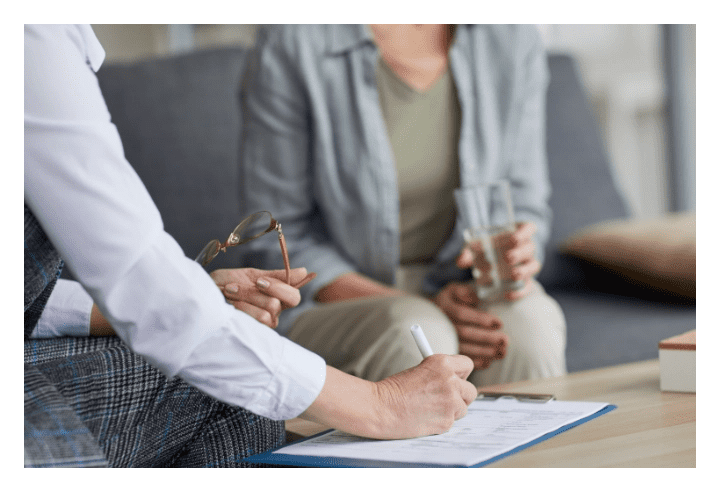What are the 12 Steps of NA?
The 12 step vision was formed in the 1930s by Alcoholics Anonymous. This movement gradually blossomed into a very successful treatment program. People began to realize that this concept works for all addictions, not just alcohol. In 1953 the first Narcotics Anonymous group was established. This was the beginning of a long tradition of people helping people.
If you consider embarking on the 12 steps of NA, you’re not alone. According to a 2020 study, roughly 45% of Americans who have recovered from substance use disorder have used 12 steps of NA programs. Like AA, NA is a free, community-based help anyone can attend.
What is Narcotics Anonymous or NA?
Narcotics Anonymous, shortened to NA in most literature, is a group of people coming together to help each other fight their narcotics addiction. The group welcomes all people who want to live drug-free. They believe in two principles, which are taking one day at a time, and it takes someone who was an addict to help an addict. These two principles are the foundation of the 12 steps of NA culture. There is only one hard and fast requirement for joining NA: you have to want to stop using narcotics.

Get Help. Get Better. Get Your Life Back.
Searching for Accredited Drug and Alcohol Rehab Centers Near You?
Even if you have failed previously and relapsed, or are in the middle of a difficult crisis, we stand ready to support you. Our trusted behavioral health specialists will not give up on you. When you feel ready or just want someone to speak to about therapy alternatives to change your life call us. Even if we cannot assist you, we will lead you to wherever you can get support. There is no obligation. Call our hotline today.
(844) 597-1011Membership in Narcotics Anonymous
Membership in Narcotics Anonymous is a personal decision reached by each individual. The only requirement for membership is the desire to stop using drugs. Anyone may join NA regardless of age, race, sexual identity, creed, religion, or lack of religion. You are a member of the fellowship when you say you are.
Narcotics Anonymous has no initiation fees or dues. Each recovering addict has paid the price of membership through the pain of active addiction. The message of NA is that any addict can stop using drugs, lose the desire to use, and find a new way to live. Our message is hope and the promise of freedom from active addiction. Most of us had no idea what to expect from living without the use of drugs.
In NA meetings, many of us first heard the message of recovery, found acceptance and support from other members, and learned practical information to help us stay clean.

Get Your Life Back
Find Hope & Recovery. Get Safe Comfortable Detox, Addiction Rehab & Dual Diagnosis High-Quality Care.
Hotline(844) 597-1011What to Expect at Meetings?
- NA describes their meetings as places to “share recovery with other addicts.”
- Each meeting is facilitated by a moderator. It is usually based on open sharing and discussing substance abuse and recovery.
- The meeting dynamic can change with the meeting’s time of day, location, or type. No two meetings are alike. Sharing at these meetings is voluntary, and participation is confidential.
- NA recommends that new members show up early, stay late, and ask lots of questions to get the most out of every meeting they attend.
- NA recommends that new members commit to a meeting every day for at least 90 days to get to know NA members and the program.
- The key with any 12 step of NA program is that results come with continued attendance. It’s unnecessary to experience a “breakthrough” at every meeting. But sustained attendance will create results in your recovery.
First-class Facilities & Amenities
World-class High-Quality Addiction & Mental Health Rehabilitation Treatment
Rehab Centers TourRenowned Addiction Centers. Serene Private Facilities. Inpatient rehab programs vary.
Addiction Helpline(844) 597-1011Proven recovery success experience, backed by a Team w/ History of:
15+
Years of Unified Experience
100s
5-Star Reviews Across Our Centers
10K
Recovery Success Stories Across Our Network
- Low Patient to Therapist Ratio
- Onsite Medical Detox Center
- Comprehensive Dual-Diagnosis Treatment
- Complimentary Family & Alumni Programs
- Coaching, Recovery & Personal Development Events
The 12 Steps of NA
- We admitted that we were powerless over our addiction, that our lives had become unmanageable.
- We came to believe that a Power greater than ourselves could restore us to sanity.
- We made a decision to turn our will and our lives over to the care of God as we understood Him.
- We made a searching and fearless moral inventory of ourselves.
- We admitted to God, to ourselves, and to another human being the exact nature of our wrongs.
- We were entirely ready to have God remove all these defects of character.
- We humbly asked Him to remove our shortcomings.
- We made a list of all persons we had harmed and became willing to make amends to them all.
- We made direct amends to such people wherever possible, except when doing so would injure them or others.
- We continued to take personal inventory and when we were wrong promptly admitted it.
- We sought through prayer and meditation to improve our conscious contact with God as we understood Him, praying only for knowledge of His will for us and the power to carry that out.
- Having had a spiritual awakening as a result of these steps, we tried to carry this message to addicts and to practice these principles in all our affairs.
World-class, Accredited, 5-Star Reviewed, Effective Addiction & Mental Health Programs. Complete Behavioral Health Inpatient Rehab, Detox plus Co-occuring Disorders Therapy.
CALL(844) 597-1011End the Addiction Pain. End the Emotional Rollercoaster. Get Your Life Back. Start Drug, Alcohol & Dual Diagnosis Mental Health Treatment Now. Get Free No-obligation Guidance by Substance Abuse Specialists Who Understand Addiction & Mental Health Recovery & Know How to Help.
The Science Behind the 12 Steps of NA
The 12 steps of NA are not medical treatment. But they have something important to offer individuals attempting to quit an addiction. The 12 steps of NA work by providing a community that attracts and engages people long-term. This support group offers members mental health benefits, reducing relapse risk. This is necessary because addiction is a chronic relapsing disease that needs ongoing support. The 12 steps of NA also emphasize that addiction is a disease, not a moral failure. This helps the person struggling with drug addiction let go of guilt, which hinders recovery.

Different Types of NA Meetings
Speaker Meeting
In a speaker meeting, one or more NA members share their experience, strength, and hope. This tends to lay out some primary symptoms and characteristics of the disease and show how NA has brought about recovery. A narrative of events accomplishes little, but a sharing of feelings, self-image, turning points, new awareness, etc., carries a message of recovery.
Open Discussion Meeting
Topics should be chosen carefully with the 12 steps of NA, 12 steps of NA Traditions, and Twelve Concepts in mind. There is a multitude of issues that relate to our recovery in NA It is essential to remember that recovery from addiction is our purpose for attending meetings and to choose topics accordingly. The following list is only a beginning point. Many other recovery-based topics come to mind as the group develops and meets the needs of its members.
Experience Transformative Recovery at We Level Up Treatment Centers.
See our authentic success stories. Get inspired. Get the help you deserve.
Start a New Life
Begin with a free call to an addiction & behavioral health treatment advisor. Learn more about our dual-diagnosis programs. The We Level Up Treatment Center Network delivers recovery programs that vary by each treatment facility. Call to learn more.
- Personalized Care
- Caring Accountable Staff
- World-class Amenities
- Licensed & Accredited
- Renowned w/ 100s 5-Star Reviews
We’ll Call You
Drug Addiction Treatment and Detox
Now that we’ve answered that question “what are the 12 steps of NA?”. It is never too late to seek help for yourself or a loved one. To determine the most effective ways to treat alcohol or drug addiction, it’s crucial to get an accurate assessment of all the symptoms. When the symptoms have been evaluated by a mental health professional, it may be determined that another form of mental condition is present and needs a particular type of treatment.
Medically-Assisted Detox
Medical detox is often considered the first stage of treatment. It will help you navigate the complicated withdrawal process, but it doesn’t address patterns of thought and behavior that contribute to drug use. Various treatment approaches and settings can help provide the ongoing support necessary to maintain long-term sobriety after you complete detox.
Cravings are very common during detox and can be challenging to overcome. This often leads to relapse. Constant medical care provided during inpatient rehab treatment helps prevent relapse. Clinicians can give necessary medication and medical expertise to lessen cravings and the effects of withdrawals.
Psychotherapy
Several different modalities of psychotherapy have been used in the treatment of mental health disorders along with addiction, including:
- Cognitive Behavioral Therapy (CBT) – is an effective treatment that involves making changes in both the patterns of negative thoughts and the behavioral routines which are affecting the daily life of the depressed person for various forms of depression.
- Dialectical Behavior Therapy – is a comprehensive mental health and substance abuse treatment program whose ultimate goal is to aid patients in their efforts to build a life worth living. The main goal of DBT is to help a person develop what is referred to as a “clear mind.”
- Person-Centered Therapy – is a strategy that allows and encourages clients to understand and resolve their concerns in a safe, supportive environment.
- Solution Focused Therapy – is an approach interested in solutions that can be quickly implemented with a simple first step leading to further positive consequences.
Dual Diagnosis Treatment
Drug abuse and mental health disorders often co-occur. In many cases, traumatic experiences can result in a mental health disorder and substance abuse. Dual diagnosis rehabilitation treats both of these issues together. The best approach for the treatment of dual diagnosis is an integrated system. In this strategy, both the substance abuse problem and the mental disorder are treated simultaneously. Regardless of which diagnosis (mental health or substance abuse problem) came first, long-term recovery will depend largely on the treatment for both disorders done by the same team or provider.
Medication-Assisted Treatments
Medication-Assisted Treatments (MAT) for substance use disorders and mental health disorders are commonly used in conjunction with one another. This includes the use of medications and other medical procedures. During your rehab, the staff from your treatment facility will help you identify what caused your addiction and teach you skills that will help you change your behavior patterns and challenge the negative thoughts that led to your addiction.
If you or a loved one are struggling with long-term drug abuse and a co-occurring mental health condition such as depression, contact one of our helpful treatment specialists today. We Level Up can provide information on dual diagnosis and medical detox programs that may fit your specific needs.

Sources:
[1] Attendance at Narcotics Anonymous and Alcoholics Anonymous meetings, frequency of attendance and substance use outcomes after residential treatment for drug dependence: a 5-year follow-up study – PubMed (nih.gov)
[2] Narcotics Anonymous Support Groups (12 Steps of NA ) – We Level Up NJ Rehab Detox Center


